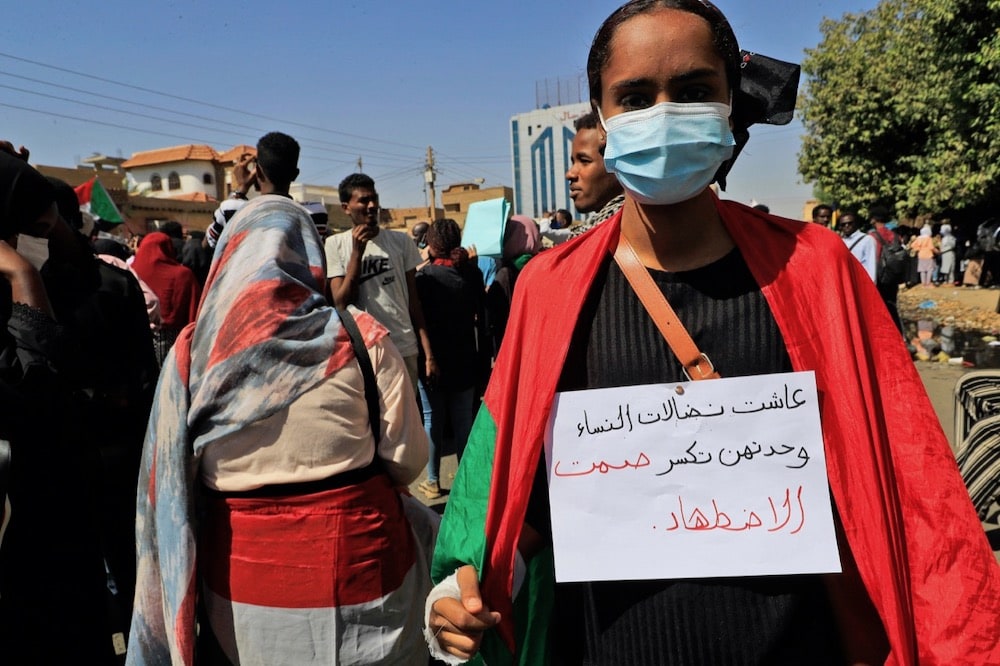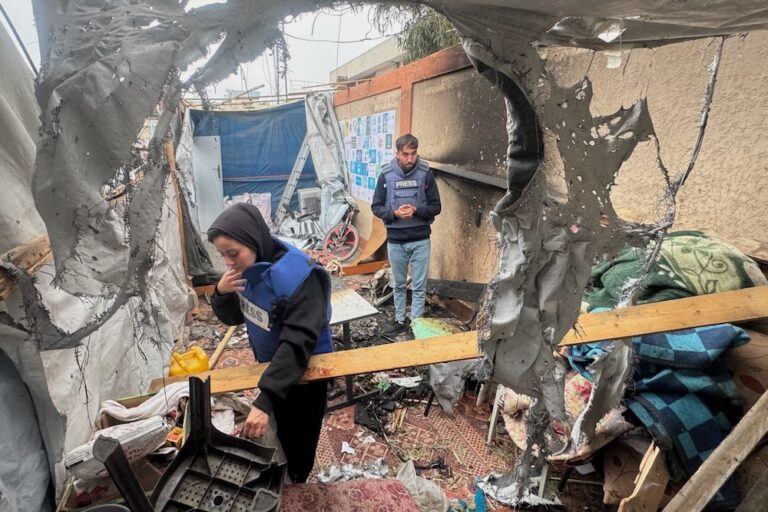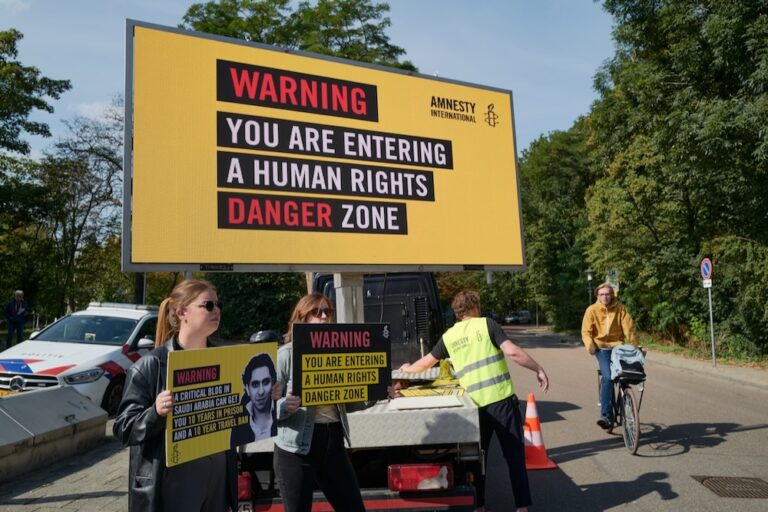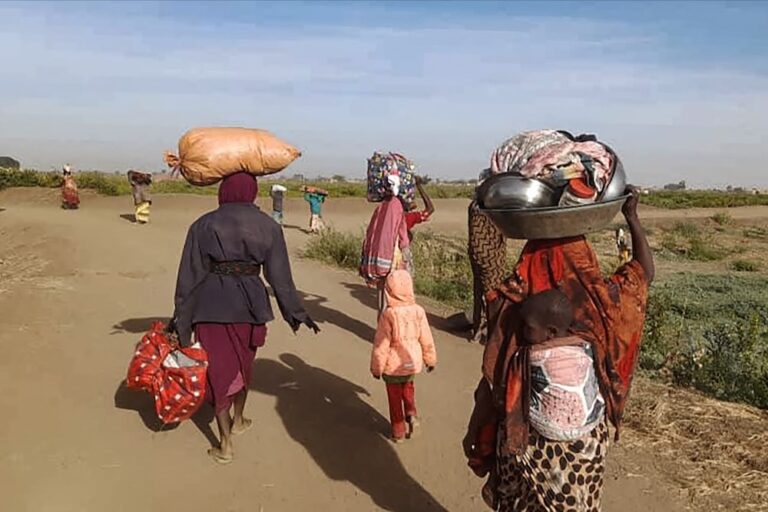February 2022 in Middle East and North Africa: A free expression roundup produced by IFEX's Regional Editor Naseem Tarawnah, based on IFEX member reports and news from the region.
Ahead of International Womens’ Day (IWD), a look at how women and civil society organisations in the region continue to battle gendered attacks online and offline for their free expression. Also, the ongoing silencing of Palestinian voices, and Iran moves to tighten its grip on the Internet, and other stories.
Surveillance, doxxing, and travel bans target women’s rights defenders
Last month, a Citizen Lab report revealed that the phone of exiled Bahraini psychiatrist Dr. Sharifa Siwar was hacked with Pegasus spyware in June 2021, while she was still in Bahrain. Dr. Siwar accused a member of the Bahrain Royal Family of alleged involvement in a scheme to sell medications for recreational use to a girls’ school. The report comes on the heels of recent revelations that two prominent women human rights activists in the region, Ebtisam Al-Saegh in Bahrain and Hala Deeb in Jordan, were also targeted with Israeli NSO Group’s Pegasus spyware.
As NSO continues to face a backlash for the sale and use of its technology, last month also revealed for the first time how the hacking of Saudi women’s rights activist Loujain Alhathloul’s phone provided the blueprint for investigations into the use of NSO’s technology to hack thousands of targets around the world, and the region.
According to rights groups Access Now and Frontline Defenders, “the impact of targeted surveillance on women can be particularly grievous, given that political, societal, and gender power asymmetries often grant authorities opportunities to weaponize the information they extract through defamation, blackmail, and doxxing. This can include the publishing of private and intimate photos and conversations online.”
IFEX member Social Media Exchange (SMEX) recently investigated how doxxing in the region is often used to target vulnerable groups and individuals including women, human rights defenders, dissidents, minorities and LGBTQ+ and gender non-conforming people. The report examined case studies from Egypt, Jordan, Lebanon, and Tunisia, where doxxing – specifically of residential information – has disproportionately impacted women and LGBTQ+ people, according to the organization.
Offline, Loujain Alhathloul and her family continue to be under a travel ban since the activist’s release last year, and she is also prohibited from expressing herself on social media. Fellow Saudi women’s rights activists Samar Badawi and Nassima Al-Sadah who were also released last year, and internet activist Naimah Al-Matrod, who was released last month in poor health, face similar bans on their right to free expression and movement. Activists and rights groups say prolonged travel bans have become a common tool used by Saudi authorities to silence peaceful critics, imprisoning them within the country’s borders.
Sexual violence, detentions, and battling online trolls
In Sudan, women human rights defenders have been facing unprecedented attacks since the October 2021 military coup. Women in detention are particularly at risk of torture, maltreatment, and sexual abuse. Those recently detained and then released have described conditions inside as ‘appallingly inhumane’.
Civil society organisations are documenting the situation and calling for accountability and change. The Regional Coalition for Women Human Rights Defenders (WHRD-MENA) reports that recent weeks have seen dozens of women protesters reporting sexual assault during their arrests, with at least 13 women raped during the ongoing protests.
Women’s rights activist Amira Osman, who was arbitrarily arrested by security forces and detained for two weeks before being released, said she faced “very bad and humiliating conditions” inside the women’s prison in Omdurman.
Activists and rights groups are also pointing to an indiscriminate ‘abduction spree’ of Sudanese protesters in recent weeks. Sudan’s secret police – or General Intelligence Service (GIS) – are believed to be responsible for the abductions, with activists reporting around 70 people taken by the GIS. Neither their families nor their lawyers know where they are. “It is yet another sign that things are going back to how they used to be, before Bashir’s overthrow led to a belief that a different Sudan was possible,” wrote Sudanese journalist Zeinab Mohammed Salih.
Earlier this year, Egyptian-Sudanese Lebanese TV anchor Dalia Ahmad was racially harassed and targeted by online trolls after calling the country’s political leaders, including Hezbollah leader Hassan Nasrallah, ‘crocodiles’ during her show on Lebanon’s Al-Jadeed news channel.
Bombarded with misogynistic and racist tweets by Hezbollah loyalists, the journalist used her show to fight back, calling on her critics to: “challenge me with ethics, arguments and reasoning, not with my skin color.”
In Egypt, journalist, novelist, and women’s rights activist Rasha Azab is facing defamation and slander charges for publicly supporting victims of rape and sexual violence allegedly committed by film director Islam Azazi. Activists and rights groups from around the world expressing solidarity with Azab say the lawsuit – brought about by Azazi – sends an indirect message “to the survivors of these crimes not to disclose what is being committed against their right to their physical safety, in light of a time when these crimes are being revealed globally.”
Palestinian women’s rights activist Khitam Saafin was sentenced to 15 months in prison by an Israeli military court for her role as director of one of several Palestinian civil society groups that have recently labelled “terrorist organizations” by Israel. President of the Union of Palestinian Women’s Committees (UPWC), Saafin had already served over a year in detention without charges, but the court counted only four months of her detention as part of her new sentence.
Silencing Palestinian voices: From Israeli apartheid to Deutsche Welle’s biased report
Last month, Amnesty International (AI) joined the growing number of prominent rights organizations to call Israel’s “system of oppression and domination against Palestinians” apartheid.
In a landmark report, the rights group pointed to the forced evictions of Palestinians in the Sheikh Jarrah neighbourhood of occupied East Jerusalem as “emblematic of the oppression which Palestinians have faced every day, for decades… the discrimination, the dispossession, the repression of dissent, the killings and injuries – all are part of a system which is designed to privilege Jewish Israelis at the expense of Palestinians.”
Amnesty’s report builds on decades of Palestinian advocacy, and follows similar reports by rights groups, including Israeli rights group B’Tselem, and IFEX member HRW, which concluded last year that Israel is “committing crimes of apartheid and persecution against Palestinians in the occupied territories.”
Deutsche Welle’s (DW) recent internal investigation into allegations of antisemitism within its Arabic-language news department resulted in the firing of seven Arab journalists last month. The journalists were investigated for allegedly expressing anti-semitic views on social media.
IFEX member the Palestinian Center for Development and Media Freedoms (MADA) called for an international investigation committee to investigate the dismissal of the journalists, saying their firings were “for political reasons and not for their violation of international freedom of expression standards, or professional standards or ethics.”
In an open letter, MADA joined over 100 rights groups in condemning DW’s “inaccurate and defamatory report”, calling it: “just the latest development in an ongoing anti-Palestinian smear campaign intended to silence Palestinian voices, restrict freedom of expression, suppress legitimate criticism of ongoing Israeli violations against Palestinians, and ultimately prevent Palestinian journalists and Palestinian organizations from seeking accountability.” The result, said the rights groups, “is a chilling effect that prevents Palestinians from sharing their experiences of oppression and systematic human rights violations with the rest of the world.”
In Brief
Egypt: The country’s jailed prisoners of conscience continue to face injustice behind bars. The unjust prison sentences against writer and activist Alaa Abd El Fattah, human rights lawyer Mohamed Baqer, and blogger Mohamed ‘Oxygen’ Ibrahim were ratified last month, with reports that the two years the activists had already been held without trial would not be deducted from their sentences.
Three Egyptian activists began hunger strikes last month to protest their indefinite pretrial detention. Held between 20 months and nearly three-and-a-half years, the activists – Ahmed Maher, Walid Shawky, and Abdel Rahman Tarek – are protesting being “recycled” into different cases, a tactic increasingly deployed by authorities to circumvent the two year legal limit on pretrial detentions and indefinitely jail critics. The three face new charges of “joining a terrorist organization,” “spreading false news,” and “misusing social media.”
February also saw the release of blogger Reda Abdel-Rahman after a year and a half in pretrial detention on charges of belonging to a terrorist organization. Meanwhile, 19 rights groups called on Egyptian authorities to urgently provide health care to Salah Soltan, the detained father of US-based prominent Egyptian rights defender, Mohamed Soltan. “Salah Soltan’s deteriorating health appears to be the result of reprisals for his son Mohamed’s advocacy in the US,” said Joe Stork, deputy Middle East and North Africa director at HRW.
Iran: Authorities continue to tighten their grip on internet freedoms in the country with recent efforts in parliament to ratify an oppressive internet bill that ARTICLE 19 said would result in “handing over [of] complete control of the internet to authorities.” While the bill’s ratification has reportedly been stalled for the moment, it remains a looming threat over Iran’s increasingly shrinking online civic space.
Case in point: prominent blogger and free speech activist, Seved Ronaghi Maleki was arrested for his critical tweets of Iran’s parliament’s moves to impose internet restrictions. A former prisoner of conscience, Maleki started a hunger strike to protest his arrest, according to Global Voices.
Kuwait: In good news for the LGBTQI+ community, the country’s constitutional court has overturned a vague law criminalising ‘imitation of [the] opposite sex’. According to Human Rights Watch (HRW), article 198 of Kuwait’s penal code – an amendment passed in 2007 – has been used to violate rights to free expression, privacy, and nondiscrimination under Kuwait’s constitution and international law.
The rights group called the court’s decision an “important step in securing justice for transgender people”, and called on Kuwaiti authorities to repeal the law, immediately release all those detained under this law, investigate allegations of police brutality in order to hold officers accountable for misconduct, and protect transgender people from violence.
Noteworthy reads
- Women’s rights in Bahrain, Postponed dreams – a new report by Americans for Democracy and Human Rights (ADHRB) that highlights the discriminatory laws that have made it difficult for victims of abuse to come forward.
- Gender Policy and Authoritarian Flexibility: The Women’s Quota in Morocco as an Instrument of Regime Support – a paper produced by the Cairo Institute for Human Rights Studies (CIHRS).
- Tunisia: Where poems lead to prison – An examination by ARTICLE 19 of six months of continuous restrictions on the right to freedom of expression and information in Tunisia.



